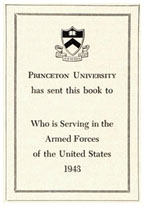
|
March 19, 2008: From the Editor
The bookplate affixed in books sent to student servicemen in 1943. |
In 1943, with so many Princeton students serving in the armed forces, President Harold Dodds *14 made a gift to those servicemen, who may not have thought to bring works of literature with them to war. Dodds sent each student a list of 70 titles and promised to mail any three books requested from the list. Writer William Zinsser ’44 later recalled in his 55th reunion book: “I got my Don Quixote at a sand-blown base outside the Algerian town of Blida. Shakespeare’s plays caught up with me in a snow-blown tent near the Italian town of Brindisi.”
Authors on Dodds’ list ranged from Homer to Hugo, from Sophocles to Steinbeck. There were several collections of poetry. And there were books about war, including Ambrose Bierce’s Civil War stories, Tolstoy’s War and Peace, and Thucydides’ History of the Peloponnesian War, which, according to a faculty statement, suggested “striking parallels between power politics in ancient Greece and power politics today.”
I was reminded of this when reading an essay, reprinted on page 9, by Newsweek editor and visiting Princeton professor Evan Thomas. Thomas writes about a literature class at West Point, in which the instructor attempts to teach works that would be meaningful to young officers.
What books would Princeton professors recommend to their own students — both the students who will graduate into military assignments, and the many more who will read and think about Iraq and Afghanistan from a comfortable distance? Several recommended classics like Erich Maria Remarque’s story of a disillusioned World War I soldier, All Quiet on the Western Front, and journalist Michael Herr’s jarring account of Vietnam, Dispatches. Historian Tony Grafton suggests John Keegan’s The Face of Battle (because Keegan “pioneered the study of how battles actually work”), Princeton Civil War scholar James McPherson’s For Cause and Comrades (“he shows how those who fight actually may be doing so for a cause that gives their war a deep meaning”), and Harvard President Drew Faust’s This Republic of Suffering (“she evokes the violence and destruction of warfare at its most profound and terrible level”).
Other faculty members, including English professor Meredith Martin, suggest volumes of poetry. (Martin recommended works of fiction, too, including Pat Barker’s Regeneration, about World War I soldiers struggling with stress disorder.) Martin proposes reading the work of First World War poets such as Wilfred Owen, who was killed in combat, alongside Brian Turner’s poems about Iraq and former Princeton professor Yusef Komunyakaa’s gritty collection, Dien Cai Dau, about the war in Vietnam.
In the journal Callaloo in 2005, an interviewer suggested that
Komunyakaa’s voice in these poems “sounds more like a murmur
than a protest cry.” Perhaps, she suggested, poems cannot say “No”
clearly. Komunyakaa disagreed. “One arrives at an approximate ‘No’
through a connection to language,” he said — “a language
where the nerves are exposed, left bare and pulsing with possibility."![]()
![]()
Marilyn H. Marks *86
mmarks@princeton.edu

